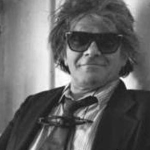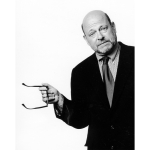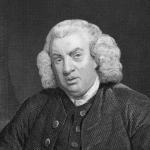i
The world without Imagination
Nota: man is the intelligence of his soil,
The sovereign ghost. As such, the Socrates
Of snails, musician of pears, principium
And lex. Sed quaeritur: is this same wig
Of things, this nincompated pedagogue,
Preceptor to the sea? Crispin at sea
Created, in his day, a touch of doubt.
An eye most apt in gelatines and jupes,
Berries of villages, a barber's eye,
An eye of land, of simple salad-beds,
Of honest quilts, the eye of Crispin, hung
On porpoises, instead of apricots,
And on silentious porpoises, whose snouts
Dibbled in waves that were mustachios,
Inscrutable hair in an inscrutable world.
One eats one paté, even of salt, quotha.
It was not so much the lost terrestrial,
The snug hibernal from that sea and salt,
That century of wind in a single puff.
What counted was mythology of self,
Blotched out beyond unblotching. Crispin,
The lutanist of fleas, the knave, the thane,
The ribboned stick, the bellowing breeches, cloak
Of China, cap of Spain, imperative haw
Of hum, inquisitorial botanist,
And general lexicographer of mute
And maidenly greenhorns, now beheld himself,
A skinny sailor peering in the sea-glass.
What word split up in clickering syllables
And storming under multitudinous tones
Was name for this short-shanks in all that brunt?
Crispin was washed away by magnitude.
The whole of life that still remained in him
Dwindled to one sound strumming in his ear,
Ubiquitous concussion, slap and sigh,
Polyphony beyond his baton's thrust.
Could Crispin stem verboseness in the sea,
The old age of a watery realist,
Triton, dissolved in shifting diaphanes
Of blue and green? A wordy, watery age
That whispered to the sun's compassion, made
A convocation, nightly, of the sea-stars,
And on the cropping foot-ways of the moon
Lay grovelling. Triton incomplicate with that
Which made him Triton, nothing left of him,
Except in faint, memorial gesturings,
That were like arms and shoulders in the waves,
Here, something in the rise and fall of wind
That seemed hallucinating horn, and here,
A sunken voice, both of remembering
And of forgetfulness, in alternate strain.
Just so an ancient Crispin was dissolved.
The valet in the tempest was annulled.
Bordeaux to Yucatan, Havana next,
And then to Carolina. Simple jaunt.
Crispin, merest minuscule in the gates,
Dejected his manner to the turbulence.
The salt hung on his spirit like a frost,
The dead brine melted in him like a dew
Of winter, until nothing of himself
Remained, except some starker, barer self
In a starker, barer world, in which the sun
Was not the sun because it never shone
With bland complaisance on pale parasols,
Beetled, in chapels, on the chaste bouquets.
Against his pipping sounds a trumpet cried
Celestial sneering boisterously. Crispin
Became an introspective voyager.
Here was the veritable ding an sich, at last,
Crispin confronting it, a vocable thing,
But with a speech belched out of hoary darks
Noway resembling his, a visible thing,
And excepting negligible Triton, free
From the unavoidable shadow of himself
That lay elsewhere around him. Severance
Was clear. The last distortion of romance
Forsook the insatiable egotist. The sea
Severs not only lands but also selves.
Here was no help before reality.
Crispin beheld and Crispin was made new.
The imagination, here, could not evade,
In poems of plums, the strict austerity
Of one vast, subjugating, final tone.
The drenching of stale lives no more fell down.
What was this gaudy, gusty panoply?
Out of what swift destruction did it spring?
It was caparison of mind and cloud
And something given to make whole among
The ruses that were shattered by the large.
ii
Concerning the Thunderstorms of Yucatan
In Yucatan, the Maya sonneteers
Of the Caribbean amphitheatre,
In spite of hawk and falcon, green toucan
And jay, still to the night-bird made their plea,
As if raspberry tanagers in palms,
High up in orange air, were barbarous.
But Crispin was too destitute to find
In any commonplace the sought-for aid.
He was a man made vivid by the sea,
A man come out of luminous traversing,
Much trumpeted, made desperately clear,
Fresh from discoveries of tidal skies,
To whom oracular rockings gave no rest.
Into a savage color he went on.
How greatly had he grown in his demesne,
This auditor of insects! He that saw
The stride of vanishing autumn in a park
By way of decorous melancholy; he
That wrote his couplet yearly to the spring,
As dissertation of profound delight,
Stopping, on voyage, in a land of snakes,
Found his vicissitudes had much enlarged
His apprehension, made him intricate
In moody rucks, and difficult and strange
In all desires, his destitution's mark.
He was in this as other freemen are,
Sonorous nutshells rattling inwardly.
His violence was for aggrandizement
And not for stupor, such as music makes
For sleepers halfway waking. He perceived
That coolness for his heat came suddenly,
And only, in the fables that he scrawled
With his own quill, in its indigenous dew,
Of an aesthetic tough, diverse, untamed,
Incredible to prudes, the mint of dirt,
Green barbarism turning paradigm.
Crispin foresaw a curious promenade
Or, nobler, sensed an elemental fate,
And elemental potencies and pangs,
And beautiful barenesses as yet unseen,
Making the most of savagery of palms,
Of moonlight on the thick, cadaverous bloom
That yuccas breed, and of the panther's tread.
The fabulous and its intrinsic verse
Came like two spirits parlaying, adorned
In radiance from the Atlantic coign,
For Crispin and his quill to catechize.
But they came parlaying of such an earth,
So thick with sides and jagged lops of green,
So intertwined with serpent-kin encoiled
Among the purple tufts, the scarlet crowns,
Scenting the jungle in their refuges,
So streaked with yellow, blue and green and red
In beak and bud and fruity gobbet-skins,
That earth was like a jostling festival
Of seeds grown fat, too juicily opulent,
Expanding in the gold's maternal warmth.
So much for that. The affectionate emigrant found
A new reality in parrot-squawks.
Yet let that trifle pass. Now, as this odd
Discoverer walked through the harbor streets
Inspecting the cabildo, the façade
Of the cathedral, making notes, he heard
A rumbling, west of Mexico, it seemed,
Approaching like a gasconade of drums.
The white cabildo darkened, the façade,
As sullen as the sky, was swallowed up
In swift, successive shadows, dolefully.
The rumbling broadened as it fell. The wind,
Tempestuous clarion, with heavy cry,
Came bluntly thundering, more terrible
Than the revenge of music on bassoons.
Gesticulating lightning, mystical,
Made pallid flitter. Crispin, here, took flight.
An annotator has his scruples, too.
He knelt in the cathedral with the rest,
This connoisseur of elemental fate,
Aware of exquisite thought. The storm was one
Of many proclamations of the kind,
Proclaiming something harsher than he learned
From hearing signboards whimper in cold nights
Or seeing the midsummer artifice
Of heat upon his pane. This was the span
Of force, the quintessential fact, the note
Of Vulcan, that a valet seeks to own,
The thing that makes him envious in phrase.
And while the torrent on the roof still droned
He felt the Andean breath. His mind was free
And more than free, elate, intent, profound
And studious of a self possessing him,
That was not in him in the crusty town
From which he sailed. Beyond him, westward, lay
The mountainous ridges, purple balustrades,
In which the thunder, lapsing in its clap,
Let down gigantic quavers of its voice,
For Crispin to vociferate again.
iii
Approaching Carolina
The book of moonlight is not written yet
Nor half begun, but, when it is, leave room
For Crispin, fagot in the lunar fire,
Who, in the hubbub of his pilgrimage
Through sweating changes, never could forget
That wakefulness or meditating sleep,
In which the sulky strophes willingly
Bore up, in time, the somnolent, deep songs.
Leave room, therefore, in that unwritten book
For the legendary moonlight that once burned
In Crispin's mind above a continent.
america was always north to him,
A northern west or western north, but north,
And thereby polar, polar-purple, chilled
And lank, rising and slumping from a sea
Of hardy foam, receding flatly, spread
In endless ledges, glittering, submerged
And cold in a boreal mistiness of the moon.
The spring came there in clinking pannicles
Of half-dissolving frost, the summer came,
If ever, whisked and wet, not ripening,
Before the winter's vacancy returned.
The myrtle, if the myrtle ever bloomed,
Was like a glacial pink upon the air.
The green palmettoes in crepuscular ice
Clipped frigidly blue-black meridians,
Morose chiaroscuro, gauntly drawn.
How many poems he denied himself
In his observant progress, lesser things
Than the relentless contact he desired;
How many sea-masks he ignored; what sounds
He shut out from his tempering ear; what thoughts,
Like jades affecting the sequestered bride;
And what descants, he sent to banishment!
Perhaps the Arctic moonlight really gave
The liaison, the blissful liaison,
Between himself and his environment,
Which was, and is, chief motive, first delight,
For him, and not for him alone. It seemed
Elusive, faint, more mist than moon, perverse,
Wrong as a divagation to Peking,
To him that postulated as his theme
The vulgar, as his theme and hymn and flight,
A passionately niggling nightingale.
Moonlight was an evasion, or, if not,
A minor meeting, facile, delicate.
Thus he conceived his voyaging to be
An up and down between two elements,
A fluctuating between sun and moon,
A sally into gold and crimson forms,
As on this voyage, out of goblinry,
And then retirement like a turning back
And sinking down to the indulgences
That in the moonlight have their habitude.
But let these backward lapses, if they would,
Grind their seductions on him, Crispin knew
It was a flourishing tropic he required
For his refreshment, an abundant zone,
Prickly and obdurate, dense, harmonious
Yet with a harmony not rarefied
Nor fined for the inhibited instruments
Of over-civil stops. And thus he tossed
Between a Carolina of old time,
A little juvenile, an ancient whim,
And the visible, circumspect presentment drawn
From what he saw across his vessel's prow.
He came. The poetic hero without palms
Or jugglery, without regalia.
And as he came he saw that it was spring,
A time abhorrent to the nihilist
Or searcher for the fecund minimum.
The moonlight fiction disappeared. The spring,
Although contending featly in its veils,
Irised in dew and early fragrancies,
Was gemmy marionette to him that sought
A sinewy nakedness. A river bore
The vessel inward. Tilting up his nose,
He inhaled the rancid rosin, burly smells
Of dampened lumber, emanations blown
From warehouse doors, the gustiness of ropes,
Decays of sacks, and all the arrant stinks
That helped him round his rude aesthetic out.
He savored rankness like a sensualist.
He marked the marshy ground around the dock,
The crawling railroad spur, the rotten fence,
Curriculum for the marvellous sophomore.
It purified. It made him see how much
Of what he saw he never saw at all.
He gripped more closely the essential prose
As being, in a world so falsified,
The one integrity for him, the one
Discovery still possible to make,
To which all poems were incident, unless
That prose should wear a poem's guise at last.
iv
The Idea of a Colony
Nota: his soil is man's intelligence.
That's better. That's worth crossing seas to find.
Crispin in one laconic phrase laid bare
His cloudy drift and planned a colony.
Exit the mental moonlight, exit lex,
Rex and principium, exit the whole
Shebang. Exeunt omnes. Here was prose
More exquisite than any tumbling verse:
A still new continent in which to dwell.
What was the purpose of his pilgrimage,
Whatever shape it took in Crispin's mind,
If not, when all is said, to drive away
The shadow of his fellows from the skies,
And, from their stale intelligence released,
To make a new intelligence prevail?
Hence the reverberations in the words
Of his first central hymns, the celebrants
Of rankest trivia, tests of the strength
Of his aesthetic, his philosophy,
The more invidious, the more desired.
The florist asking aid from cabbages,
The rich man going bare, the paladin
Afraid, the blind man as astronomer,
The appointed power unwielded from disdain.
His western voyage ended and began.
The torment of fastidious thought grew slack,
Another, still more bellicose, came on.
He, therefore, wrote his prolegomena,
And, being full of the caprice, inscribed
Commingled souvenirs and prophecies.
He made a singular collation. Thus:
The natives of the rain are rainy men.
Although they paint effulgent, azure lakes,
And April hillsides wooded white and pink,
Their azure has a cloudy edge, their white
And pink, the water bright that dogwood bears.
And in their music showering sounds intone.
On what strange froth does the gross indian dote,
What Eden sapling gum, what honeyed gore,
What pulpy dram distilled of innocence,
That streaking gold should speak in him
Or bask within his images and words?
If these rude instances impeach themselves
By force of rudeness, let the principle
Be plain. For application Crispin strove,
Abhorring Turk as Esquimau, the lute
As the marimba, the magnolia as rose.
Upon these premises propounding, he
Projected a colony that should extend
To the dusk of a whistling south below the south.
A comprehensive island hemisphere.
The man in Georgia waking among pines
Should be pine-spokesman. The responsive man,
Planting his pristine cores in Florida,
Should prick thereof, not on the psaltery,
But on the banjo's categorical gut,
Tuck tuck, while the flamingos flapped his bays.
Sepulchral señors, bibbing pale mescal,
Oblivious to the Aztec almanacs,
Should make the intricate Sierra scan.
And dark Brazilians in their cafés,
Musing immaculate, pampean dits,
Should scrawl a vigilant anthology,
To be their latest, lucent paramour.
These are the broadest instances. Crispin,
Progenitor of such extensive scope,
Was not indifferent to smart detail.
The melon should have apposite ritual,
Performed in verd apparel, and the peach,
When its black branches came to bud, belle day,
Should have an incantation. And again,
When piled on salvers its aroma steeped
The summer, it should have a sacrament
And celebration. Shrewd novitiates
Should be the clerks of our experience.
These bland excursions into time to come,
Related in romance to backward flights,
However prodigal, however proud,
Contained in their afflatus the reproach
That first drove Crispin to his wandering.
He could not be content with counterfeit,
With masquerade of thought, with hapless words
That must belie the racking masquerade,
With fictive flourishes that preordained
His passion's permit, hang of coat, degree
Of buttons, measure of his salt. Such trash
Might help the blind, not him, serenely sly.
It irked beyond his patience. Hence it was,
Preferring text to gloss, he humbly served
Grotesque apprenticeship to chance event,
A clown, perhaps, but an aspiring clown.
There is a monotonous babbling in our dreams
That makes them our dependent heirs, the heirs
Of dreamers buried in our sleep, and not
The oncoming fantasies of better birth.
The apprentice knew these dreamers. If he dreamed
Their dreams, he did it in a gingerly way.
All dreams are vexing. Let them be expunged.
But let the rabbit run, the cock declaim.
Trinket pasticcio, flaunting skyey sheets,
With Crispin as the tiptoe cozener?
No, no: veracious page on page, exact.
v
A Nice Shady Home
Crispin as hermit, pure and capable,
Dwelt in the land. Perhaps if discontent
Had kept him still the pricking realist,
Choosing his element from droll confect
Of was and is and shall or ought to be,
Beyond Bordeaux, beyond Havana, far
Beyond carked Yucatan, he might have come
To colonize his polar planterdom
And jig his chits upon a cloudy knee.
But his emprize to that idea soon sped.
Crispin dwelt in the land and dwelling there
Slid from his continent by slow recess
To things within his actual eye, alert
To the difficulty of rebellious thought
When the sky is blue. The blue infected will.
It may be that the yarrow in his fields
Sealed pensive purple under its concern.
But day by day, now this thing and now that
Confined him, while it cosseted, condoned,
Little by little, as if the suzerain soil
Abashed him by carouse to humble yet
Attach. It seemed haphazard denouement.
He first, as realist, admitted that
Whoever hunts a matinal continent
May, after all, stop short before a plum
And be content and still be realist.
The words of things entangle and confuse.
The plum survives its poems. It may hang
In the sunshine placidly, colored by ground
Obliquities of those who pass beneath,
Harlequined and mazily dewed and mauved
In bloom. Yet it survives in its own form,
Beyond these changes, good, fat, guzzly fruit.
So Crispin hasped on the surviving form,
For him, of shall or ought to be in is.
Was he to bray this in profoundest brass
Arointing his dreams with fugal requiems?
Was he to company vastest things defunct
With a blubber of tom-toms harrowing the sky?
Scrawl a tragedian's testament? Prolong
His active force in an inactive dirge,
Which, let the tall musicians call and call,
Should merely call him dead? Pronounce amen
Through choirs infolded to the outmost clouds?
Because he built a cabin who once planned
Loquacious columns by the ructive sea?
Because he turned to salad-beds again?
Jovial Crispin, in calamitous crape?
Should he lay by the personal and make
Of his own fate an instance of all fate?
What is one man among so many men?
What are so many men in such a world?
Can one man think one thing and think it long?
Can one man be one thing and be it long?
The very man despising honest quilts
Lies quilted to his poll in his despite.
For realists, what is is what should be.
And so it came, his cabin shuffled up,
His trees were planted, his duenna brought
Her prismy blonde and clapped her in his hands,
The curtains flittered and the door was closed.
Crispin, magister of a single room,
Latched up the night. So deep a sound fell down
It was as if the solitude concealed
And covered him and his congenial sleep.
So deep a sound fell down it grew to be
A long soothsaying silence down and down.
The crickets beat their tambours in the wind,
Marching a motionless march, custodians.
In the presto of the morning, Crispin trod,
Each day, still curious, but in a round
Less prickly and much more condign than that
He once thought necessary. Like Candide,
Yeoman and grub, but with a fig in sight,
And cream for the fig and silver for the cream,
A blonde to tip the silver and to taste
The rapey gouts. Good star, how that to be
Annealed them in their cabin ribaldries!
Yet the quotidian saps philosophers
And men like Crispin like them in intent,
If not in will, to track the knaves of thought.
But the quotidian composed as his,
Of breakfast ribands, fruits laid in their leaves,
The tomtit and the cassia and the rose,
Although the rose was not the noble thorn
Of crinoline spread, but of a pining sweet,
Composed of evenings like cracked shutters flung
Upon the rumpling bottomness, and nights
In which those frail custodians watched,
Indifferent to the tepid summer cold,
While he poured out upon the lips of her
That lay beside him, the quotidian
Like this, saps like the sun, true fortuner.
For all it takes it gives a humped return
Exchequering from piebald fiscs unkeyed.
vi
And Daughters with Curls
Portentous enunciation, syllable
To blessed syllable affined, and sound
Bubbling felicity in cantilene,
Prolific and tormenting tenderness
Of music, as it comes to unison,
Forgather and bell boldly Crispin's last
Deduction. Thrum, with a proud douceur
His grand pronunciamento and devise.
The chits came for his jigging, bluet-eyed,
Hands without touch yet touching poignantly,
Leaving no room upon his cloudy knee,
Prophetic joint, for its diviner young.
The return to social nature, once begun,
Anabasis or slump, ascent or chute,
Involved him in midwifery so dense
His cabin counted as phylactery,
Then place of vexing palankeens, then haunt
Of children nibbling at the sugared void,
Infants yet eminently old, then dome
And halidom for the unbraided femes,
Green crammers of the green fruits of the world,
Bidders and biders for its ecstasies,
True daughters both of Crispin and his clay.
All this with many mulctings of the man,
Effective colonizer sharply stopped
In the door-yard by his own capacious bloom.
But that this bloom grown riper, showing nibs
Of its eventual roundness, puerile tints
Of spiced and weathery rouges, should complex
The stopper to indulgent fatalist
Was unforeseen. First Crispin smiled upon
His goldenest demoiselle, inhabitant,
She seemed, of a country of the capuchins,
So delicately blushed, so humbly eyed,
Attentive to a coronal of things
Secret and singular. Second, upon
A second similar counterpart, a maid
Most sisterly to the first, not yet awake
Excepting to the motherly footstep, but
Marvelling sometimes at the shaken sleep.
Then third, a thing still flaxen in the light,
A creeper under jaunty leaves. And fourth,
Mere blusteriness that gewgaws jollified,
All din and gobble, blasphemously pink.
A few years more and the vermeil capuchin
Gave to the cabin, lordlier than it was,
The dulcet omen fit for such a house.
The second sister dallying was shy
To fetch the one full-pinioned one himself
Out of her botches, hot embosomer.
The third one gaping at the orioles
Lettered herself demurely as became
A pearly poetess, peaked for rhapsody.
The fourth, pent now, a digit curious.
Four daughters in a world too intricate
In the beginning, four blithe instruments
Of differing struts, four voices several
In couch, four more personæ, intimate
As buffo, yet divers, four mirrors blue
That should be silver, four accustomed seeds
Hinting incredible hues, four self-same lights
That spread chromatics in hilarious dark,
Four questioners and four sure answerers.
Crispin concocted doctrine from the rout.
The world, a turnip once so readily plucked,
Sacked up and carried overseas, daubed out
Of its ancient purple, pruned to the fertile main,
And sown again by the stiffest realist,
Came reproduced in purple, family font,
The same insoluble lump. The fatalist
Stepped in and dropped the chuckling down his craw,
Without grace or grumble. Score this anecdote
Invented for its pith, not doctrinal
In form though in design, as Crispin willed,
Disguised pronunciamento, summary,
Autumn's compendium, strident in itself
But muted, mused, and perfectly revolved
In those portentous accents, syllables,
And sounds of music coming to accord
Upon his law, like their inherent sphere,
Seraphic proclamations of the pure
Delivered with a deluging onwardness.
Or if the music sticks, if the anecdote
Is false, if Crispin is a profitless
Philosopher, beginning with green brag,
Concluding fadedly, if as a man
Prone to distemper he abates in taste,
Fickle and fumbling, variable, obscure,
Glozing his life with after-shining flicks,
Illuminating, from a fancy gorged
By apparition, plain and common things,
Sequestering the fluster from the year,
Making gulped potions from obstreperous drops,
And so distorting, proving what he proves
Is nothing, what can all this matter since
The relation comes, benignly, to its end?
So may the relation of each man be clipped.


















Comment form: